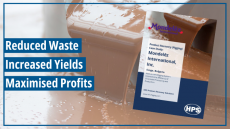Wimm-Bill-Dann seeking Urals dairy foothold
on the country's dairy market by tapping into the under-exploited
Urals region. But after a year of falling profit margins, is the
company biting off more than it can chew? Chris Mercer
reports.
There are currently two dairies and one baby food plant up for grabs in the Urals region and Wimm-Bill-Dann (WBD), Russia's leading juice and dairy products producer, is negotiating for all three as part of a plan to establish more regional bases across the country.
WBD already owns 23 plants throughout Russia and the Ukraine but has nothing in the Urals region, where the market for whole milk grew by 34 per cent between 2001 and 2003, according to Russian financial company UralSib.
The regional city of Perm is also one of the few Russian cities with a population of more than one million people and no large dairy company in the market, something WBD wants to take advantage of.
But two years of rapid expansion have led to falling profits for WBD as a result of increasing transport and maintenance costs, as well as the rising cost of milk, on which the company relies to manufacture its products.
Company profit margins fell to 27.7 per cent for the first half of 2004, compared to 30.3 per cent after the first half of 2003, even though sales rose by 22.8 per cent.
And it is thought WBD would have to pay around RUR350.5 million (€9.7million) for each of the three plants it is interested in, almost as much as the company's 2004 first half profits.
Despite this, company chief executive officer, Sergei Plastinin, told Cee-FoodIndustry.com that WBD sales were benefiting from increased regional production. "We remain committed to our regional expansion strategy and we are constantly widening our regional product offering as consumer spending is growing steadily in the regions," he said.
WBD also faces potential competition from France-based Danone - itself a shareholder in WBD and frequently cited as an eventual buyer of WBD - which is also said to be interested in boosting its own Russian subsidiary, Danone Industria, through acquiring the Urals-based companies.
John Band, analyst for UK-based market research company Datamonitor, said that the next two years will be a testing time. "WBD really ought to be starting to turn its investment into profits within that time, and it needs to start selling more premium products to offset the high milk prices," he said.
"There is also a danger when you get a company like WBD, which has expanded very quickly by merging lots of smaller companies, that you end up with a situation where nobody really knows what's going on," said Band.
But WBD can take encouragement from the Russian government's desire to expand the country's dairy industry in order to export more produce to the European Union.
Just last week, the EU gave its approval to three Russian dairy companies (PJSC Lianozovo Dairy in Moscow, Altayholod in Barnayl, Altayskiy territory and PJSC Lipetskiy hladokombinat in Lipetsk, Lipetskiy region) to begin exports to the 25-member trading bloc, the first Russian companies to do so, and others are expected to follow suit - provided they meet the EU's stringent food safety requirements.
Ironically, Russia is currently blocking imports of dairy products from Poland on the grounds that they do not meet its own hygiene standards - a move seen as a thinly veiled attempt to protect its domestic market from rising numbers of imports.ENDS.








